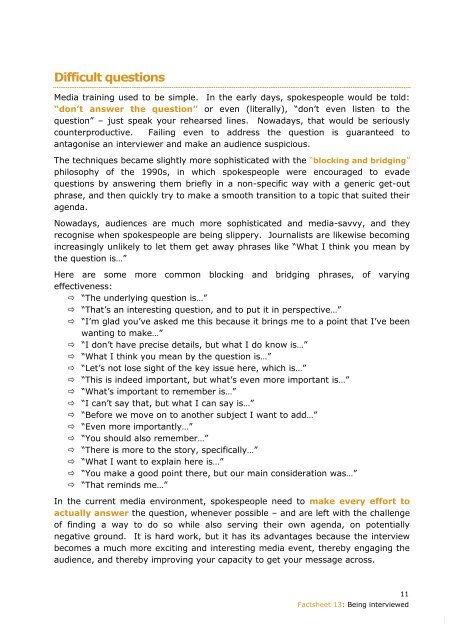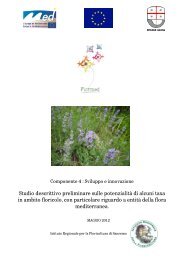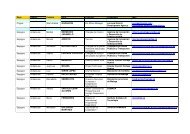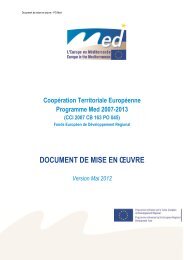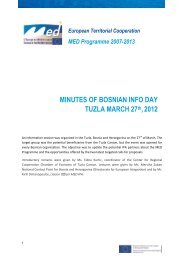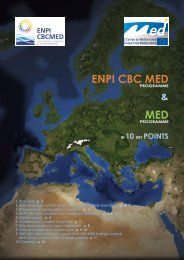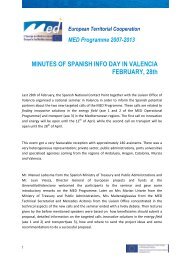MED Communication Handbook - Programme Med
MED Communication Handbook - Programme Med
MED Communication Handbook - Programme Med
You also want an ePaper? Increase the reach of your titles
YUMPU automatically turns print PDFs into web optimized ePapers that Google loves.
Difficult questions<br />
<strong>Med</strong>ia training used to be simple. In the early days, spokespeople would be told:<br />
“don’t answer the question” or even (literally), “don’t even listen to the<br />
question” – just speak your rehearsed lines. Nowadays, that would be seriously<br />
counterproductive. Failing even to address the question is guaranteed to<br />
antagonise an interviewer and make an audience suspicious.<br />
The techniques became slightly more sophisticated with the “blocking and bridging”<br />
philosophy of the 1990s, in which spokespeople were encouraged to evade<br />
questions by answering them briefly in a non-specific way with a generic get-out<br />
phrase, and then quickly try to make a smooth transition to a topic that suited their<br />
agenda.<br />
Nowadays, audiences are much more sophisticated and media-savvy, and they<br />
recognise when spokespeople are being slippery. Journalists are likewise becoming<br />
increasingly unlikely to let them get away phrases like “What I think you mean by<br />
the question is…”<br />
Here are some more common blocking and bridging phrases, of varying<br />
effectiveness:<br />
� “The underlying question is…”<br />
� “That’s an interesting question, and to put it in perspective…”<br />
� “I’m glad you’ve asked me this because it brings me to a point that I’ve been<br />
wanting to make…”<br />
� “I don’t have precise details, but what I do know is…”<br />
� “What I think you mean by the question is…”<br />
� “Let’s not lose sight of the key issue here, which is…”<br />
� “This is indeed important, but what’s even more important is…”<br />
� “What’s important to remember is…”<br />
� “I can’t say that, but what I can say is…”<br />
� “Before we move on to another subject I want to add…”<br />
� “Even more importantly…”<br />
� “You should also remember…”<br />
� “There is more to the story, specifically…”<br />
� “What I want to explain here is…”<br />
� “You make a good point there, but our main consideration was…”<br />
� “That reminds me…”<br />
In the current media environment, spokespeople need to make every effort to<br />
actually answer the question, whenever possible – and are left with the challenge<br />
of finding a way to do so while also serving their own agenda, on potentially<br />
negative ground. It is hard work, but it has its advantages because the interview<br />
becomes a much more exciting and interesting media event, thereby engaging the<br />
audience, and thereby improving your capacity to get your message across.<br />
11<br />
Factsheet 13: Being interviewed<br />
�


